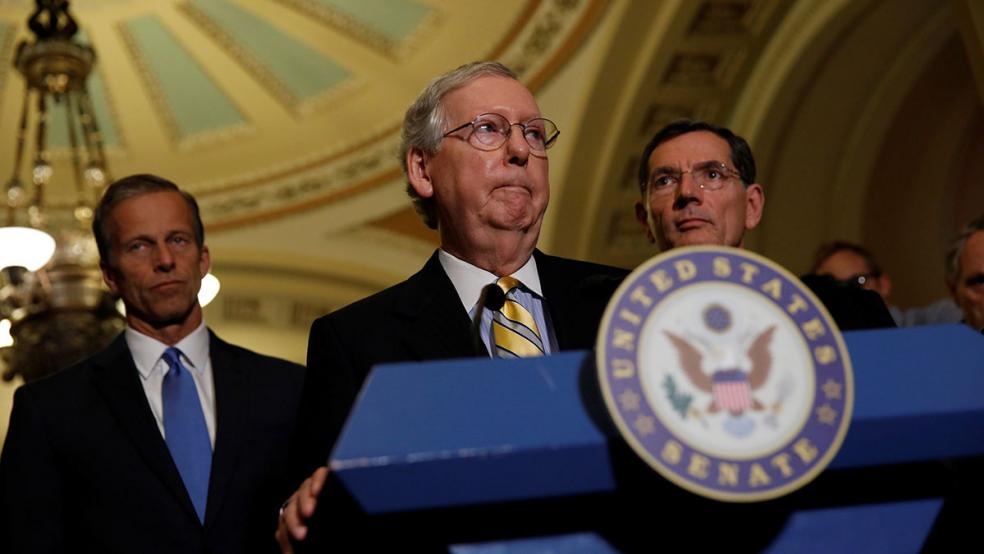Bowing to the reality that he doesn’t have the votes to bring the Senate’s version of Affordable Care Act repeal to the floor for debate, much less to approve it, Majority Leader Mitch McConnell on Tuesday conceded that there will be no effort to vote on the Better Care Reconciliation Act before the Senate leaves for its July 4 recess.
“We’re going to continue the discussion within our conference on the difference that we have,” McConnell said in a brief press conference outside a lunch for Senate Republicans at which the state of play of the bill had been discussed. “Consequently, we will not be on the bill this week but we are still working toward getting at least 50 people in a comfortable place.”
Related: Here Are Five Reasons Why the GOP’s Health Bill Is Doomed
He said that President Trump would be taking a more active role in lobbying senators for support, beginning with a meeting at the White House scheduled for Tuesday afternoon. The Republicans need the support of at least 50 of their 52 members to move the bill forward under budget reconciliation rules. The goal, McConnell added, is to reach an agreement on how to move forward by the end of this week when lawmakers leave town for nine days.
McConnell has been criticized for how he handled the health care bill, allowing it to be crafted in secret by 13 white male Republican senators. He released a preliminary draft of it last Thursday, with no public hearings, just a week before he insisted on holding a vote, and then issued an amended version of the bill on Monday.
On Tuesday, though, he rejected the idea that the failure to schedule a vote before the end of the week was an indictment of the closed-door process he employed, repeatedly stressing that the bill is complex and the process of coming to agreement time-consuming.
“We’re going to press on,” he said. “We think the status quo is unsustainable for all the obvious reasons we’ve discussed over and over against, and we’re optimistic that we’re going to get to a result that’s better than the status quo.”
Related: Senate Proposes Harsh Penalty for Going Without Insurance
But the prospects for ultimate success looked worse than ever Tuesday, with multiple Republican senators expressing opposition to the bill from different sides -- some claiming it is too harsh, others that it doesn’t go far enough. The ability of Senate leaders to find a way to bring one group of resistant lawmakers on board without further alienating the others seemed questionable at best.
One of the senators who has expressed concern that the bill will harm the poor and people who rely on Medicaid, Maine’s Susan Collins, said she was skeptical that the meeting with Trump scheduled for later in the afternoon would do much to move her. She also criticized his overall approach to passing health care reform.
“This president is the first president who has had neither political nor military experience and thus it has been a challenge for him to learn how to interact with Congress and how to push his agenda forward,” she said. “I also believe it would have been better had the President started with infrastructure which has bipartisan support rather than tackling a politically divisive and technically complex issue like health care.”
Asked about the meeting at the White House, she added, “I am going to the White House. If the president wants to have a meeting with me I’m certainly willing to go and listen to what he has to say. I will say that I have so many fundamental problems with the bill...that it’s difficult for me to see how any tinkering is going to satisfy my fundamental and deep concerns about the bill.”
Related: The Obvious Problem With the ‘Simple’ GOP Solution for Health Care
The fact that senators can now expect to return from the July 4 recess to further battles over the health care reform package will contribute to the already-compressed nature of the legislative scheduled over the next few months. The Senate is scheduled to be in session for just three weeks in July, which is likely not enough time to both pass its own health care bill and strike an agreement with the House of Representatives to meld the two chambers’ bills and send something to the president’s desk.
After the three-week stretch in July, Congress will leave town again, this time for five and a half weeks.
If the health care bill is still hanging fire at that point, the time pressure will be intense, because the plan to pass it using a 2017 budget reconciliation bill only works while it’s still Fiscal 2017. That won’t be the case after September 30.
But there will be a lot of competition for Senators’ attention in September. The Treasury will run out of tricks to put off violating the debt ceiling sometime this fall, placing the government at risk of a catastrophic default unless Congress can come to an agreement on the always contentious subject of federal spending.
Related: Rough Seas Ahead for Senate Passage of the GOP Health Care Bill
Also, with the end of Fiscal 2017 comes the need for a 2018 budget agreement, without which the executive branch of the federal government will face a shutdown.
Moreover, the market for non-group health insurance under the ACA is already in serious disarray with the administration refusing to give insurers clarity on whether it will continue making risk-sharing payments or enforce the individual mandate. If that continues into the Fall, the damage could be enormous.
It’s going to be a hot summer in DC.





